忆岛饭店
No comments yet
|$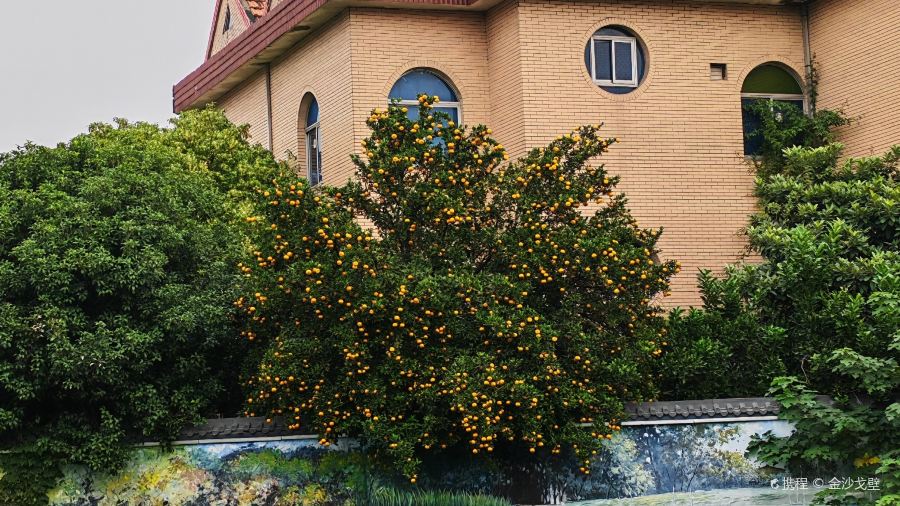
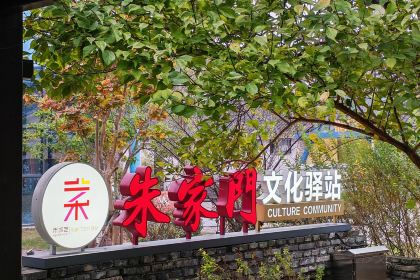
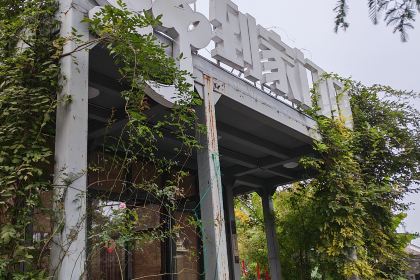
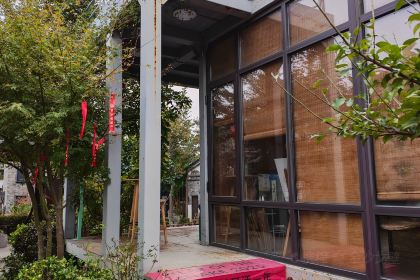
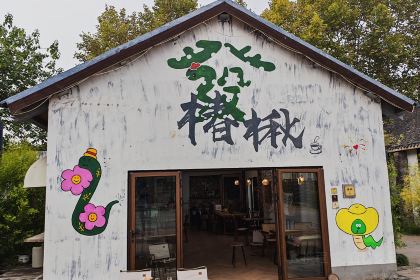

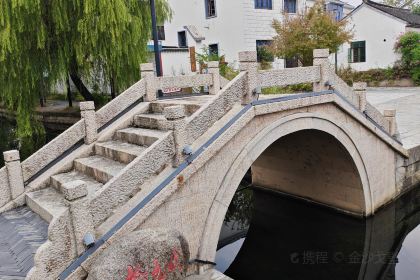
More
+8613429443513
浙江省嘉兴市海盐县澉浦镇六里街翠屏路77号
 金沙戈壁In the vein of sea salt, Zhu's door is a low-singing ancient ballad. The mottled old wall is wrapped in the years, and the gray texture is faintly visible. A deep brown wooden door stands quietly, screens filter through the noise of the world, the four words "jurenyouyi" on the door are like ancient training engraved, and the ink marks swim between the Confucian wind bones. And the platinum forehead of the "corner mountain house" is like a taciturn old man, guarding the unfinished story, waiting for the wind to read. At the corner, the moon cave door fell into the world like a full moon, framed a path of blue bricks, greenery on both sides. Through this round arch, he stepped into another heavy space-time winding path through the secluded place, grass and trees grow, white walls and tiles half-covered between branches and leaves, as if the ancients left a poem, waiting for a modern encounter. The plaque of the "Country Culture Master Studio" on the wall quietly connects the dialogue between ancient and modern times, so that this old house in the fold of time, continues to write new texts. Zhu's door is quiet. Its quietness is not death, but living submersion. Every brick is breathing, every crack is the footnote of the years. Who has lived here? A hermit who sings on the piano, or a Confucian student who burns and reads the rolls? Now only the whisper of the wind through the moon's cave door, and the birdsong dripping from the horns, keep their secrets. If the city is a noisy river, Zhujiamen is a meteorite on the bank of the river, let the waves roll over, and look at themselves. It uses the old face to lift a shade of culture, let the seeker stop here, touch the temperature of history, and hear the echo of the future.
金沙戈壁In the vein of sea salt, Zhu's door is a low-singing ancient ballad. The mottled old wall is wrapped in the years, and the gray texture is faintly visible. A deep brown wooden door stands quietly, screens filter through the noise of the world, the four words "jurenyouyi" on the door are like ancient training engraved, and the ink marks swim between the Confucian wind bones. And the platinum forehead of the "corner mountain house" is like a taciturn old man, guarding the unfinished story, waiting for the wind to read. At the corner, the moon cave door fell into the world like a full moon, framed a path of blue bricks, greenery on both sides. Through this round arch, he stepped into another heavy space-time winding path through the secluded place, grass and trees grow, white walls and tiles half-covered between branches and leaves, as if the ancients left a poem, waiting for a modern encounter. The plaque of the "Country Culture Master Studio" on the wall quietly connects the dialogue between ancient and modern times, so that this old house in the fold of time, continues to write new texts. Zhu's door is quiet. Its quietness is not death, but living submersion. Every brick is breathing, every crack is the footnote of the years. Who has lived here? A hermit who sings on the piano, or a Confucian student who burns and reads the rolls? Now only the whisper of the wind through the moon's cave door, and the birdsong dripping from the horns, keep their secrets. If the city is a noisy river, Zhujiamen is a meteorite on the bank of the river, let the waves roll over, and look at themselves. It uses the old face to lift a shade of culture, let the seeker stop here, touch the temperature of history, and hear the echo of the future.Reviews of 忆岛饭店
Some reviews may have been translated by Google Translate
0/5
All (11)
Latest
Photo reviews (11)
The rain in Jiangnan always seems to write poetry on the green tiles, and the Zhu Family Gate in Haiyan is like a poem left behind by time. Stepping into this village hidden in the heart of the city is like stepping on the hem of time—the stone bridge, cracked and mottled, still supports the hurried footsteps of passersby; the stream flows around the houses, reflecting the simple beauty of white walls and black tiles, occasionally a fallen leaf breaking the mirror-like surface, ripples spreading six hundred years of history. Deep in the alleys, bamboo paintings hang on the fences, the bamboo strips interwoven into flowers that never fade. Peonies bloom with crimson hues on round plaques, farmers gather spring blossoms under the shade of trees, and the everyday life depicted by bamboo strips is even more vibrant than ink paintings. Around the corner, the lanterns of "Sanying Bookstore" glow subtly red, the wooden door creaks, the aroma of tea mixed with the scent of ink wafts from the window, and a lazy dog curls up by the threshold, guarding this world steeped in words. The soul of Zhu Family Gate settles behind the wooden door of "Three Shadows on White Ground." The old house cannot contain its elegance; verdant greenery peeks through the walls, climbing the bricks and whispering secrets to the blooming flowers outside. Here, handicrafts, teahouses, and calligraphy and paintings become secret languages in dialogue between the past and present. A cup of tea here allows one to savor the gentle charm of half of Jiangnan; a turn of a page in a book unravels the cultural heritage of the entire village. As twilight soaks into the eaves, Zhu Family Gate resembles a scroll imbued with the marks of time. Where the water whispers, old times intertwine with new stories, and this living museum, with the utmost composure, transforms everyday life into poetic verses.
Stepping into Zhujiamen in Haiyan is like entering a poem steeped in time. The mottled blue brick walls whisper of bygone eras, while sunlight filtering through the leaves dances on the signboard—the words "Zhujiamen Cultural Station" remain as vibrant as ever, like a half-open door inviting visitors to explore the old dreams and new chapters of this land. Vines climb the gray walls, their withered stems intertwined with the new green leaves, as if the pulse of time has solidified here. On the wall, two hand-painted snails sleep soundly beside the holes of a stone mill, their pink cheeks slightly flushed, their expressions endearing. The childlike brushstrokes embrace the ancient bricks, like a dialogue across time—how much grain has the stone mill once ground? Now, it carries the snails' dreams, transforming the trivialities of life into lines of artistic poetry. Around the corner, a modern steel-framed building stands suspended in mid-air, its pink steps adorned with auspicious Year of the Snake phrases, playful and seemingly mocking the passage of time. Large glass windows shatter the shadows of bamboo blinds into picturesque scenes; rusty railings and newly red steps face each other, contradictory yet harmonious. Here, old and new are never separated, but rather like streams and rocks, their collisions creating a unique rhythm. The Zhu family gate is still. When the wind blows, the moss in the cracks of the bricks trembles slightly, vines stretch silently, and the grass sprouts in the corners can no longer contain themselves, peeking out tender green tips from between the stones. Here, too, is movement—the ink of scholars flows through the inn, the footsteps of travelers echo softly on the steps, and perhaps the snails hiding on the walls are eavesdropping on the stories of everyday life under the cover of night. Every brick and tile, every leaf and vine, Zhujiamen, with the gentle grace of Jiangnan, distills history into wine, and with the brushstrokes of art, adds a touch of rosy dawn to the future. Here, time is no longer a one-way river, but tangible ripples, rippling eternally between old and new traces.
In a secluded corner of Haiyan, the Zhu Family Gate, like a yellowed page of poetry, quietly unfolds in the long river of time. Moss-covered white walls bear the marks of time, while layered black tiles resemble piano keys; when the wind blows, they seem to play a distant, melodious Jiangnan ballad. Vines meander up the wrought-iron sign that reads "Arrival at Home," rust and greenery intertwining like the lines of time, subtly stitching the modern and the past together. Stepping through this gate is like stepping into a paradise forgotten by time. Winding stone paths, whispering grass, and hammocks sway gently in the shadows of trees seem to invite one to leave behind the hustle and bustle of the world and breathe with nature. Low walls made of old bricks support mottled pottery jars, and wild plants grow freely, as if every leaf is telling a story of free poetry. Traditional pavilion corners peek out from the greenery, their upturned eaves casting shadows on the clouds, while painted kites hang in mid-air atop the walls, seemingly ready to take flight and carry their long-forgotten stories to the heavens. Here, white walls are the paper, tiled eaves are the ink, and vegetation is the rhyme. The peeling plaster hides whispers of wind and rain, while sprawling branches connect the changing seasons. Zhujiamen is more than just a place name; it's like an unfinished prose poem—in the folds of ancient charm, lies the essence of life and the brilliance of art, waiting for every dreamer to use their footsteps as a pen to continue writing their own slow-paced story.
Nestled in the folds of Haiyan, lies a lane gently caressed by time—the Zhu Family Gate. Like a yellowed page of poetry, it unfolds slowly in the misty rain of Jiangnan, its words imbued with ancient charm and tranquility. At the lane's entrance, wisteria casts its shadow like a curtain, clusters of deep blue and light purple blossoms leaning against the white wall, like lines of poetry left behind by the ancients, trembling lightly in the wind. Where the vines meander, two bamboo chairs and a wooden table stand quietly, seemingly waiting for travelers to sit down, sip a pot of tea, and listen to a story of the past. Where the peeling plaster of the walls reveals exposed gray bricks, they resemble the wrinkled hands of an old man, bearing the weight of a century of time. Turning into the narrow alley, the four characters "At the Doorway to Home" on the wooden sign are warm and welcoming, guiding those returning home and those passing through. Beneath the sign, lanterns with swaying red tassels and corners overgrown with wild grass create a charming contrast—half bustling with life, half wild and untamed. The cobblestone path winds forward, the wooden window lattices of the old houses on both sides carved into geometric poems, the low-hanging eaves telling tales of bygone dreams beneath the gable walls. Suddenly, a pool of clear water appears beneath an overturned earthenware pot, its bottom mottled with green moss, fish nibbling at their reflections, fallen leaves and red spoons floating on the surface like an overturned palette. This small pond seems to embrace the beauty of nature, even the flowing water reciting the elegant verses of "winding stream party." The Zhu Family Gate is a hermit's paradise, and also a stage for life. The wooden gates of private guesthouses are tightly closed, yet they cannot contain the whispers of osmanthus and vines; lanterns hang high in artist-run guesthouses, blending the pulse of modern cultural creativity into the texture of ancient walls. The aroma of coffee mingles with the scent of ink, Hanfu robes brush against posters of cultural and creative exhibitions, and old times and new stories intertwine here. This alley is a love letter from Jiangnan to the world—written with blue bricks as paper and vines as ink, filled with the Zen-like tranquility of "great seclusion in the city." Stepping out of the alley, one is suddenly struck by how lightly time can flow, living out an immortal slow movement in the dust of history.
In the gentle veins of Haiyan, Zhujiamen is a poem quietly hidden deep within time. The houses with their blue bricks and gray tiles, like elders emerging from the wrinkles of time, silently watch over this land. The red-tiled roofs conceal traces of daily life, with occasional satellite dishes peeking out, like whispers between the past and present. A tree of oranges, laden with golden joy, sways gracefully on its branches, seemingly telling of the land's abundance. Behind the lush foliage, a landscape mural unfolds along the wall, its brushstrokes subtly blending the beauty of nature with the elegance of human culture. Below the mural, the stone-paved riverbank is covered in moss, like lines etched by time. The river flows gently, reflecting the sky and the shadows of the trees, with duckweed floating on the water, creating ripples of green. On the bank, weeping willows sway gently, their slender branches like emerald curtains, lightly brushing the water's surface. Beneath the shade of willows, stone tables and benches stand quietly, their rough surfaces bearing the marks of time. Sitting here, one can listen to the rustling of willow leaves in the breeze, and watch the elegant silhouette of the arched bridge spanning the riverbank. The bridge's arches are reflected in the water, creating a charming interplay with the real bridge structure, resulting in a smooth and harmonious scene. Zhujiamen offers a tranquility and elegance reminiscent of an ink painting, free from the hustle and bustle of the city. Here, time seems to slow down, allowing one to unexpectedly encounter a secluded beauty, lost in the gentle flow of water and the swaying willows, forgetting all about the past.